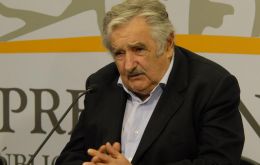MercoPress. South Atlantic News Agency
Economy
-
Friday, July 1st 2011 - 03:14 UTC
Brazil exceeds primary budget surplus target and keeps net debt under control

Brazil’s primary budget surplus exceeded expectations in May, providing additional support for the central bank in its efforts to cool the fastest inflation since 2005. The bank also revealed that net debt for May was 39.8% of GDP.
-
Thursday, June 30th 2011 - 21:07 UTC
French food giants battle over Brazil’s number one retailer

Two French food giants are locked in a battle to take over Brazil's number one retailer, Grupo Pao de Acucar. Proposals to merge Pao de Acucar with the local operations of Carrefour are opposed by rival Casino, which already has a stake in the Brazilian group.
-
Thursday, June 30th 2011 - 20:10 UTC
Relief in financial markets: Greece approves austerity and privatization package

The Greek parliament approved on Thursday detailed austerity and privatization bills in a crucial vote to secure emergency funds and avert imminent bankruptcy, but longer-term dangers still lurk.
-
Thursday, June 30th 2011 - 20:06 UTC
Pickets take to the streets of Britain to protest pension reforms

Teachers and civil servants marched through the streets and picketed government buildings across Britain today in protest at planned pension reforms, launching what could be a long period of labour unrest over austerity measures.
-
Thursday, June 30th 2011 - 17:42 UTC
Colombian group takes over Uruguay main supermarkets chain, Disco and Devoto

France’s Casino Guichard-Perrachon Colombian retailing branch, Exito announced the signing of a share purchase agreement for the acquisition of Casino' majority stakes in Uruguay’s main supermarket chain Disco and Devoto in an operation involving 746 million US dollars.
-
Thursday, June 30th 2011 - 17:12 UTC
Magallanes Corriedale rams with NZ genetics exported to Peru

Magallanes Region in the extreme south of Chile is exporting rams to Peru to help improve the meat and wool conditions of the flock of that country. The first batch of ten rams was dispatched by the Teheul Aike rural society, via Santiago and has already reached their destination in Puno.
-
Thursday, June 30th 2011 - 16:47 UTC
Mercosur plans coordinate tariffs mechanism to contain “unexpected surge of imports”

Brazil’s proposal to Mercosur members of a coordinated tariffs’ package with the purpose of containing unexpected imports surges, particularly of cheap products, from Europe, Asia and the United States is to be implemented in the second half of the year.
-
Thursday, June 30th 2011 - 16:44 UTC
Uruguay calls on Sao Paulo corporations to help develop (not colonize) Mercosur

Uruguayan president Jose Mujica called on Sao Paulo corporations to cooperate with the development of Mercosur partners by adopting a policy of alliances with local companies and leaving aside ‘colonizing’ temptations.
-
Thursday, June 30th 2011 - 07:23 UTC
Brazil calls for conclusion of EU/Mercosur trade talks and warns about cheap imports

Brazilian president Dilma Rousseff said it was urgent for Mercosur/European Union trade negotiations to conclude although also emphasizing the need to promote and intensive South/South relations, but warning that some outer region countries are intent in “sending us what they can’t sell in developed countries”.
-
Thursday, June 30th 2011 - 07:17 UTC
UN Economic Commission raises Latam’s growth estimate: 4.5% to 5%

The UN Economic Commission for Latin America and the Caribbean, Eclac, raised its 2011 growth estimate for the region to between 4.5% and 5%, said Executive Secretary Alicia Bárcena.
